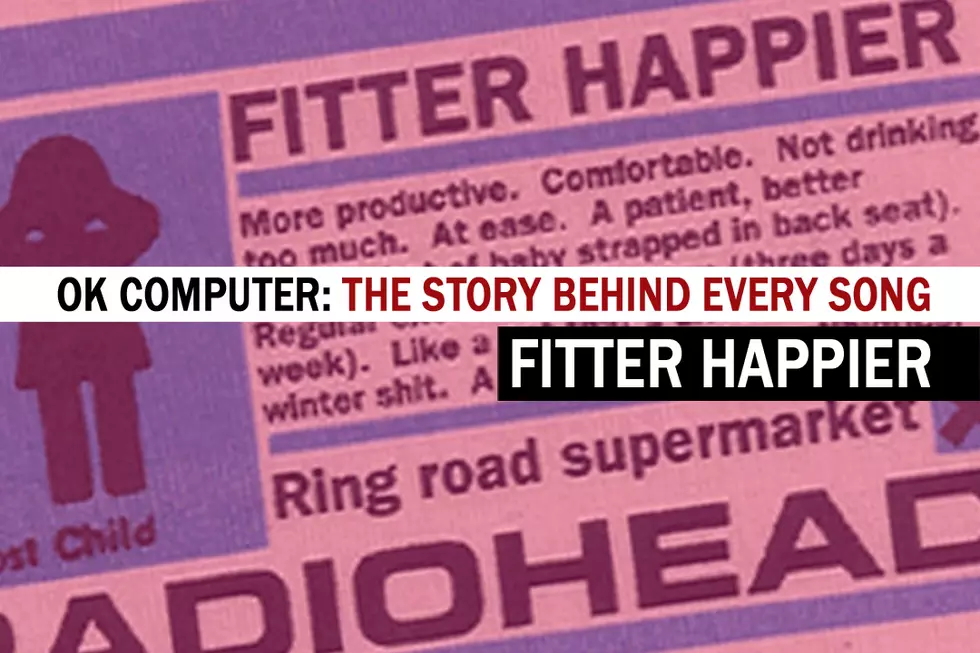
Writer’s Block and Unsettled Thoughts Inform Radiohead’s ‘Fitter Happier’
For Radiohead's OK Computer manifesto, look no further than the album's seventh track, "Fitter Happier."
The song is, first and foremost, a commentary on modern society's obsession with conformity and keeping up appearances, and how draining such upkeep can be. However, "Fitter Happier" also speaks to dualities---for example, the dangers of suppressing human emotion and interaction, but how artificial such relationships can be. "Regular exercise at the gym, three days a week / Getting on better with your associate employee contemporaries / At ease," the song says at one point. "No longer afraid of the dark or midday shadows / Nothing so ridiculously teenage and desperate / Nothing so childish / At a better pace, slower and more calculated."
As "Fitter Happier" progresses, cracks in the well-adjusted façade start to appear ("Now self-employed / Concerned, but powerless") before becoming full-blown yawning chasms by the song's end ("No longer empty and frantic / Like a cat / Tied to a stick / That's driven into / Frozen winter s---"). It's emblematic of how madness can subtly creep in and infect the soul, as well as external relationships.
Unsurprisingly, the song emerged during a tough time in vocalist Thom Yorke's life. "I had writer's block for three months," he told Humo in 1997. "In that period, I could only make lists of words. It took me a long time to figure out that the only way I could translate my thoughts was with these lists." Speaking to Select, Yorke elaborated on that thought, saying that "the reason 'Fitter Happier' exists is cause of mental background noise. Some days you're in a disturbed state and it moves to the front."
According to Q, Yorke borrowed some phrases from self-help books and the line “a pig in a cage on antibiotics” from Jonathan Coe’s book, What a Carve Up!. Once Yorke had his thoughts somewhat gathered, he typed them out on his Mac in one giant brain dump. “I crept upstairs and did this in 10 minutes,” he said. “I was feeling incredible hysteria and panic, and it was so liberating to give the lyrics to this neutral-sounding computer.”
To vocalize "Fitter Happier," Radiohead also gave into zeroes and ones. As stormy, decaying piano echoes in the background, a computerized voice recites the song's lyrics. This voice belongs to Fred, one of the text-to-speech voices that's still built into Macintosh computers.
Bassist Colin Greenwood remarked to Humo that it's "weird how much emotion there is in that voice," an assessment with which Yorke concurred. "That voicebox is the most emotional voice I've heard in ages." (At the time, physicist Stephen Hawking used the same software for his voice.) Still, the vocalist admitted that the mindset he was in at the time did pass.
"I'm not standing behind the lyrics any more. Sometimes your ideas get entangled with other ideas and then you have to apologize for the original idea because it doesn't make sense any more. That's what happened with 'Fitter Happier.' Now, I listen to the piano part."
Still, the song is inextricably linked with OK Computer. "Fitter Happier" was used to promote the record—for example, Radiohead's label took out full-page ads in British tabloids featuring nothing but the lyrics, while vintage merch featured stylized slogans from the song—and it played before the band took the stage during the OK Computer tour.
Today, the song's alienation still feels entirely relevant. If anything, it's more relevant today, in an age where social media fosters both connection and detachment—and dystopian vibes feel stronger every day.
Radiohead Albums Ranked in Order of Awesomeness
More From Diffuser.fm









